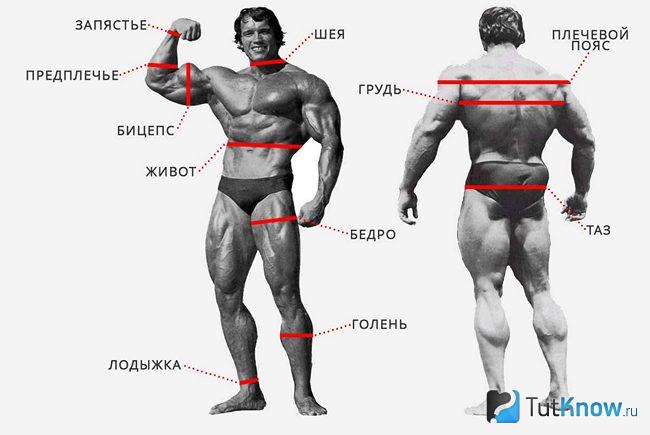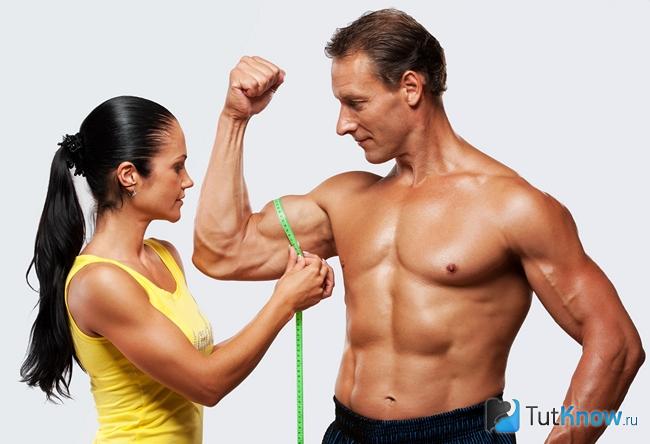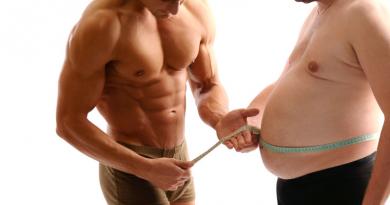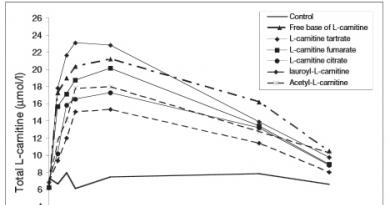Contents of the article:
Visual assessment of progress in bodybuilding is extremely subjective. Many athletes want more accurate results to track the effectiveness of their training. This is an interesting enough topic to make an article on it. Thus, today you will learn how to take bodybuilding body measurements at home. This, in turn, will help you track your growth and make appropriate adjustments to your training process or nutrition.
Are there ideal body proportions?
Not many people who visit fitness centers only want to get rid of a few kilos and increase the volume of their biceps by a couple of centimeters. Every person wants to look attractive, which makes the topic of ideal body proportions eternal. In relation to bodybuilding, it is even more relevant. This is suggested by the very name of this sport, which can be translated as “body building.”
Let’s not talk now about the fact that modern professional bodybuilding has shifted towards muscle volume. Agree that the person whose body proportions are closer to ideal looks more attractive. Unfortunately, there is often a significant disproportion in muscle development among trainees. We could list the possible options for a long time, but we won’t do that.
Just take a closer look at yourself and those around you first. Surely you will find confirmation of our words. We say this to the fact that some athletes believe that since they do not plan to compete, then it is not necessary to attach special importance to body proportions. We can agree with this, but only partially. You must understand that proportions are of utmost importance in terms of the results that you can achieve in accordance with the characteristics of your body.
If you start monitoring the development of all the muscles in your body, your training process will become more conscious and effective. First of all, this will allow you to avoid serious mistakes when drawing up a training program in the gym. If, say, you don’t pay any attention to your leg muscles, then you won’t be able to build up big biceps or beautiful breasts. However, let's move on to the main topic of our conversation - how to take body measurements at home for bodybuilding?
Digital body proportions in bodybuilding

In our lives, a lot is determined by numbers, and body proportions are no exception. Any process or object can be described by one formula or another. When applied to the body, this is the golden ratio. Using this number, you can describe all the proportions of the human body, say, the ratio of the lengths of the limbs and the torso. If we return to the numbers, the golden ratio is the following ratio: 1 to 1.618.
For example, we take the length of your thigh as one, then your shin and leg should be 1.618 of this parameter. Man is a rational being and our body strives for harmony in all matters. Unconsciously, we judge the beauty of the body based on the golden ratio. Returning to bodybuilding, all of the above presupposes the need to pump up every muscle group, and not approach this issue selectively.
One of the most obvious steps in this direction is changing the ratio of waist and shoulder girdle sizes. Many professional bodybuilders at the initial stage of their career make the main task of optimizing the waist-shoulder ratio to 1: 1.618, which, by the way, is called the Adonis index. If you have a thin build, then it will be much easier for you to increase the size of your shoulder girdle. But endomorphs should first take care of their waist.
To achieve ideal proportions, you must first decide on your basic golden ratio. Only after this should you start drawing up a training plan. It is quite obvious that all visitors to the gyms have unique body structure features and differ in their level of training. In this regard, the optimal starting point when calculating ideal proportions will be the pelvis. Most often, this part of the body turns out to be the most massive in the human body.
With girls, everything is quite simple and the ideal combination continues to be the well-known “90–60–90”. For men, everything is more confusing and now you will see it:
- The ratio of the circumference of the pelvis to the chest is 9 to 10. For example, if your pelvis is 90 centimeters in circumference, then your chest should be 100 centimeters.
- The circumference of the neck relative to the chest will be 38 percent - the chest is 100 centimeters, then the neck is 38.
- The circumference of the forearms relative to the chest is 30 percent - with a chest circumference of 100 centimeters, the forearms should measure 30.
- The circumference of the lower leg is 60% of the size of the thigh or 40 percent of the circumference of the pelvis.
- Waist circumference - 70 percent of chest circumference.
- Thigh circumference - 60 percent of the pelvic circumference.
How to take body measurements correctly in bodybuilding?

Having figured out the optimal ratios of various parts of the body, let's find out how to take body measurements at home for bodybuilding. Let's start with two simple rules that you have to follow:
- To measure your body size, use a regular measuring tape.
- The procedure should be carried out in the morning, when the muscles are in a relaxed state after sleep.
Don't pull the measuring tape too tight, but don't let it sag either.
There is no need to exaggerate or minimize your achievements. Athletes often try to make themselves seem better than they really are. To do this, various techniques are used, for example, pulling in the stomach or drawing air into the lungs. Of course, this way you can get to the cherished parameters faster, but why deceive yourself?
Measurements must be taken in the same place a couple of times
To get the most accurate results, the procedure should be performed several times. In addition, it is important to take measurements in the same place. Look for some identifier on each body part, such as a mole. As a result, it will be easier for you to take measurements, and the results obtained will be as accurate as possible.
Keep a diary of measurements and a photo album
Remember to photograph yourself from three angles every two or three months. This will be an excellent addition to dry numbers, because visual assessment is also important.
Using these approaches, you can better monitor your progress and make necessary changes to your training program. At first, all this may seem like a waste of time, but as soon as you notice the first results of your studies, the situation will change. The answer to the question of how to take body measurements at home for bodybuilding will not be complete without stating the main places where the procedure is performed:
- Ankle- while standing on straightened legs, measure the thinnest part.
- Shin- the leg being measured must be placed on the toe and the procedure must be carried out at the widest point of the calf muscle.
- Hip- place your working leg forward slightly and take a measurement under the buttocks in the upper third of the thigh.
- Pelvis- this part of our body is quite difficult to measure, and you may not do it.
- Waist- while standing on straightened legs, exhale calmly. In this case, your hands should be lowered down. The procedure is carried out in the narrowest place.
- Breast- the position for taking measurements is similar to the previous one, and the procedure is performed at the widest point. Men should also target the latissimus dorsi muscles.
- Biceps- clench your palm into a fist and raise your elbow joint to shoulder level. Measure the widest part of the biceps, namely its peak.
- Neck- slightly raise your head and perform the procedure at the base of the Adam's apple.
- Forearm- clench your hand into a fist, turning it in the direction opposite to the body. Tighten your muscles by bending your elbow joint at a right angle. The dimension is seen at the widest point.
- Wrist- relax your hand and place it on a horizontal, flat surface. The procedure must be carried out in the thinnest place.
- Buttocks- Take a standing position with your hands behind your back and place them one on top of the other. Measure the most protruding part.
What additional options allow you to monitor your progress?

We answered the main question of today's conversation - how to take body measurements at home for bodybuilding? However, there are several other metrics that will also help you track your progress.
Body mass index
This is one of the simplest, but at the same time quite effective “indicator”. Every person knows that the optimal weight should be equal to the difference between height in centimeters and body weight in kilograms. However, an even more effective indicator is body mass index (BMI). It can be calculated using the following formula: BMI = M/H2. M in this formula is the body weight in kilos, and H is nothing more than height in meters. The optimal BMI is in the range from 25 to 27.
Heart rate
For all people involved in sports, this is one of the most important indicators. If during strength training it should not be high, then during the period of weight loss the situation is different. To estimate the intensity of your training process, you can use Karvonen’s formula: HR = HR max. – Heart rate at rest x intensity (in %) + Heart rate at rest.
Let's look at an example of calculations. Let's say you are 25 years old and your resting heart rate (HR) is 60 beats per minute. You want to know how to achieve 85 percent training intensity:
- Maximum heart rate (HR max) - 220 – 20 = 195.
- 195 – 60 = 135.
- 135 x 85% = 114.
- 114 + 60 = 174.
Energy costs
This is the last indicator that is important for all fitness enthusiasts. It affects the energy value of the diet. You will find tables online that will help you calculate this indicator.
For detailed instructions on how to take bodybuilding body measurements at home, see the video below:



